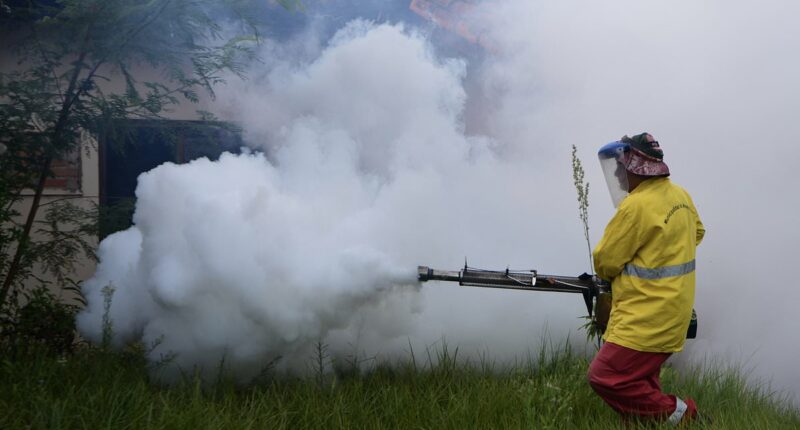Share this @internewscast.com
Chinese officials announced Covid-like quarantines in some cities as cases of chikungunya virus continue to increase.
Over 7,000 cases of the mosquito-borne virus have been reported across the southern city of Foshan in the Guangdong province of the country.
Patients in the city are forced to stay in hospitals where their beds are covered with mosquito nets for a week or until they test negative, if sooner. No deaths have yet been reported.
At least 12 other cities in Guangdong have reported infections, with about 3,000 cases being reported over the past week, bringing the total to over 10,000 in the country.
Those experiencing fevers, joint pain or rashes are being asked to visit the nearest hospital so they can be tested for the virus in the country.
Additionally, officials had ordered travelers from Foshan to undergo a 14-day home quarantine, similar to Covid restrictions, but that has since been withdrawn.
Hong Kong also reported its first chikungunya case this week involving a 12-year-old boy who developed a fever, rash and joint pain after traveling to Foshan in July.
The chikungunya virus is primarily spread by the Aedes mosquito species, and nearly half a million became infected between 2004 and 2005, leading to a worldwide epidemic.
Diana Rojas Alvarez, a medical officer at the WHO, said of the new cases: ‘We are seeing history repeating itself,’ referencing the 2004-2005 outbreak.

Chikungunya infections are most common in Asia, Africa and South America (Pictured: A municipal worker eradicating virus-spreading mosquitos in Asuncion, Paraguay)
Chikungunya infections are most common in Asia, Africa and South America, though more recently cases have also emerged across Europe and the US.
The virus can cause symptoms like fever, joint pain and life-threatening complications related to the heart and brain.
The infection does not spread from person to person through bodily contact or saliva and can only be transmitted through a bite from an infected mosquito.
Given the sudden increase in cases in China, the CDC has issued a travel advisory for Americans traveling to the country, urging them to exercise ‘increased caution’ following the outbreak.
The federal agency is also asking Americans to ensure they have received both vaccinations against chikungunya.
In late 2023, the FDA approved a vaccine for chikungunya for people over the age of 18 who are at increased risk of exposure to the virus called IXCHIQ.
Similarly, another vaccine that mimics the effects of chikungunya in the body to build immunity, called VIMKUNYA, was also licensed in February 2025 for use in those aged 12 and above.
These are not routine vaccines and are recommended to those traveling to areas with outbreaks or elevated risk and laboratory workers with potential exposure to the chikungunya virus.
Experts are also asking people to regularly use insect repellents and wear long-sleeve clothing to prevent mosquito bites this summer.
The current global surge began in early 2025, with major outbreaks in the Indian Ocean islands of La Reunion, Mayotte and Mauritius.
According to the European Center for Disease Prevention and Control, there have been about 240,000 Chikungunya virus cases and 90 related deaths in 16 countries since the beginning of 2025 as of August 4.

Over 7,000 cases of a mosquito-borne virus have been reported across the southern city of Foshan in the Guangdong province of China

The chikungunya virus is spread primarily by Aedes mosquito species (illustration pictured)
The virus has also spread to Madagascar, Somalia, Kenya and India and is making its way to Europe.
Case counts have also been increasing in Samoa, Tonga, French Polynesia, Fiji and Kiribati.
As of August 5, the CDC reports there have been 46 cases of chikungunya infections in the US that were contracted while traveling to high-risk areas. No deaths have yet been reported.
While it remains unclear where patients contracted the virus, the federal agency has issued an elevated risk of exposure notice for Brazil, Colombia, India, Mexico, Nigeria, Pakistan, Philippines and Thailand and now China.
Approximately 200 cases of the virus were reported in 2024 in the US. There are no reports on deaths.
According to the CDC, chikungunya was rarely identified in American travelers before 2006.
However, between 2006 and 2013, nearly 30 people tested positive for the infection every year in the US.
All were travelers visiting or returning to the US from affected areas in Asia, Africa, or the Indian Ocean.
In 2014, 2,799 cases, out of which 12 were locally acquired, were reported in various US states, including Florida, Texas, Puerto Rico, and the Virgin Islands, marking the year as the highest ever.

Though not fatal, chikungunya can cause a range of effects, which are primarily marked by a sudden onset of fever and severe joint pain, while other common symptoms include muscle pain, headache, nausea, fatigue and rashes.
While the acute phase of the illness usually resolves within a week or two, the joint pain can persist for weeks, months or even years in some individuals.
However, in some cases, infections can progress to severe dengue, which can cause potentially life-threatening complications such as internal bleeding and organ damage, and death.
In extreme cases, eye, heart and neurological complications have also been reported in people suffering from a chikungunya infection.
Newborns, adults aged 65 and older and people with certain health conditions are also at risk of developing Type 2 diabetes, heart disease and high blood pressure due to an infection.
While the virus cannot be transmitted directly from person to person, people can become infected with chikungunya when mosquitoes feed on an infected person and then bite them.
If a pregnant woman is infected around the time of delivery, the baby can also be infected at birth, which often results in severe disease in the baby.
While there is no medication to treat a chikungunya infection, its symptoms can be managed by taking acetaminophen for pain and drinking lots of fluids.













